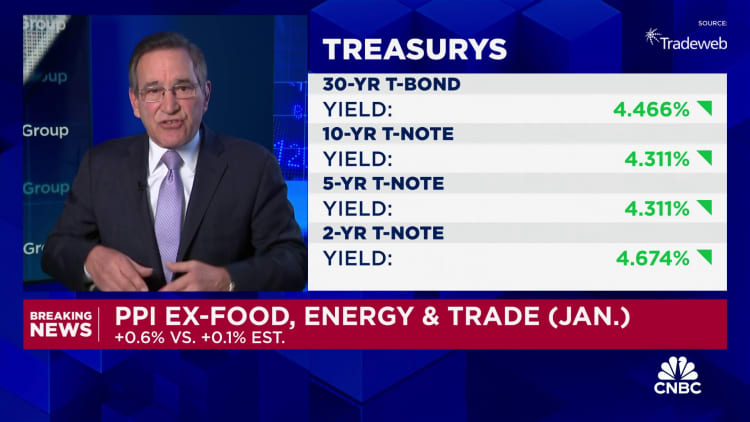
Wholesale prices rose more than expected in January, further complicating the inflation picture, according to a US Labor Department report on Friday.
The producer price index, a measure of prices received by producers of domestic goods and services, rose 0.3% during the month, the biggest move since August. Economists surveyed by Dow Jones were looking for an increase of just 0.1%. The Producer Price Index fell by 0.2% in December.
Excluding food and energy, the core Producer Price Index rose 0.5%, also against expectations for a 0.1% rise. The producer price index excluding food, energy and business services jumped 0.6%, the largest single-month advance since January 2023.
The report comes just days after the CPI showed that inflation remains steadily high despite the Federal Reserve's expectations of moderation through the year. The CPI rose 3.1% from a year ago, down from its level in December, but still well ahead of the Fed's 2% inflation target.
On a core basis, which the Fed focuses more on as a measure of long-term inflation, the CPI rose 3.9%. The CPI differs from the Producer Price Index because it measures the prices that consumers actually pay in the market.
Markets fell sharply after Tuesday's CPI reading, and there were fears that hot PPI numbers could also trigger another shakeout. Expectations have risen that the Fed will use easing inflation numbers as a catalyst to cut interest rates aggressively this year, but traders have been forced to scale back those expectations in recent days as inflation showed unexpected persistence.
Stock market futures fell after the producer price index report and a rise in Treasury yields.
Just a few weeks ago, markets were pricing in the Fed's first interest rate cut in March. That has since been scaled back to June as policymakers expressed caution about abandoning the fight against inflation too quickly while noting that a stable economy buys them time before having to act.
A 0.6% increase in final order service helped push the wholesale index higher, which itself was boosted by a 2.2% increase in hospital outpatient care. Commodity prices actually fell by 0.2% on the back of a 1.7% drop in final energy demand, with gasoline falling by 3.6%.
On a 12-month basis, the headline producer price index rose by just 0.9%, slightly below the 1% level in December. However, excluding food, energy and business services, the index rose by 2.6%.
Besides the troubling inflation readings, the Commerce Department reported this week that retail sales in January fell by 0.8%, much more than expected.
Don't miss these stories from CNBC PRO:
